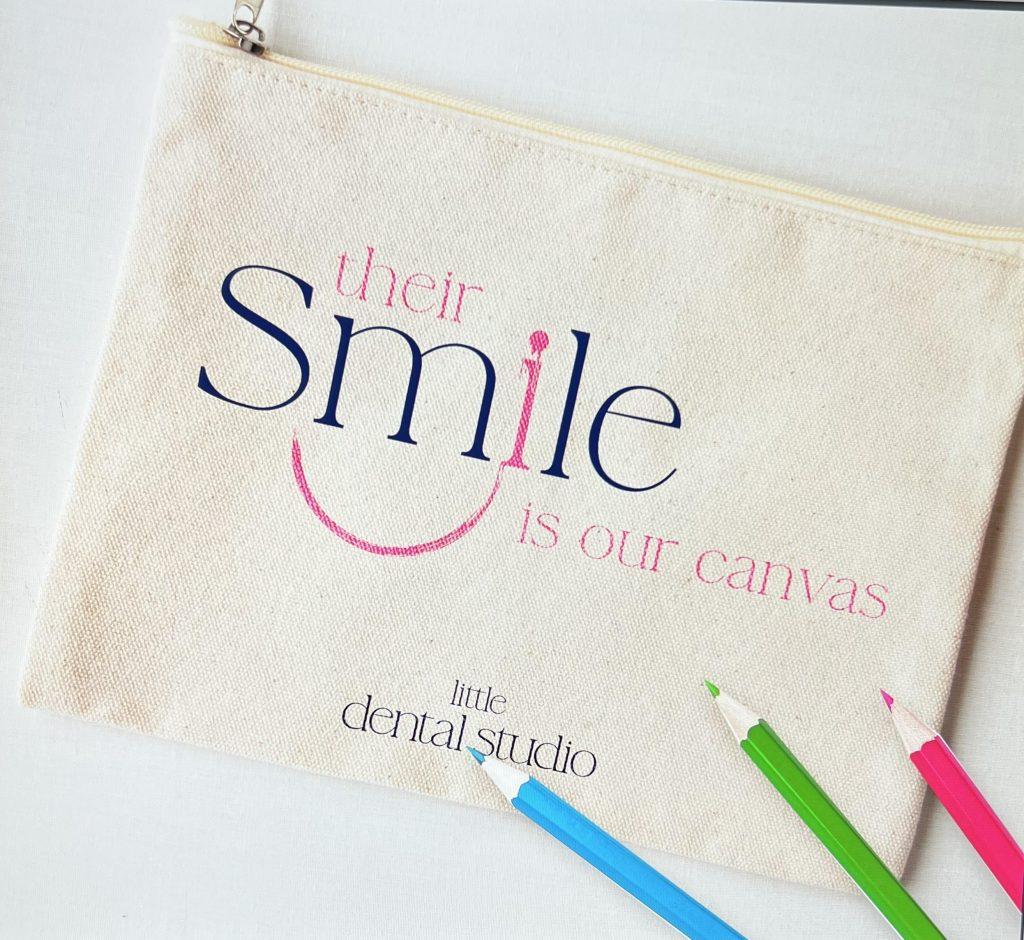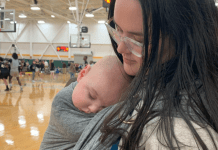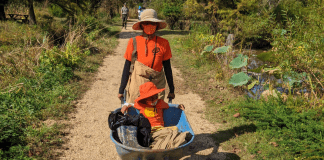As parents, it is our responsibility to ensure our children’s teeth are well-taken care of. Luckily, DC is home to excellent pediatric dentists like Dr. Angela Austin who can help you achieve optimal health for your kids. Ready for this Pediatric Dentist to answer common questions?
We recently sat down with Dr. Austin, a Board Certified Pediatric Dentist and owner of both Little Dental Studio and Alexandria Children’s Dentistry, to get her pro tips and recommendations to make sure our kids maintain their beautiful smiles! Here’s what she shared.
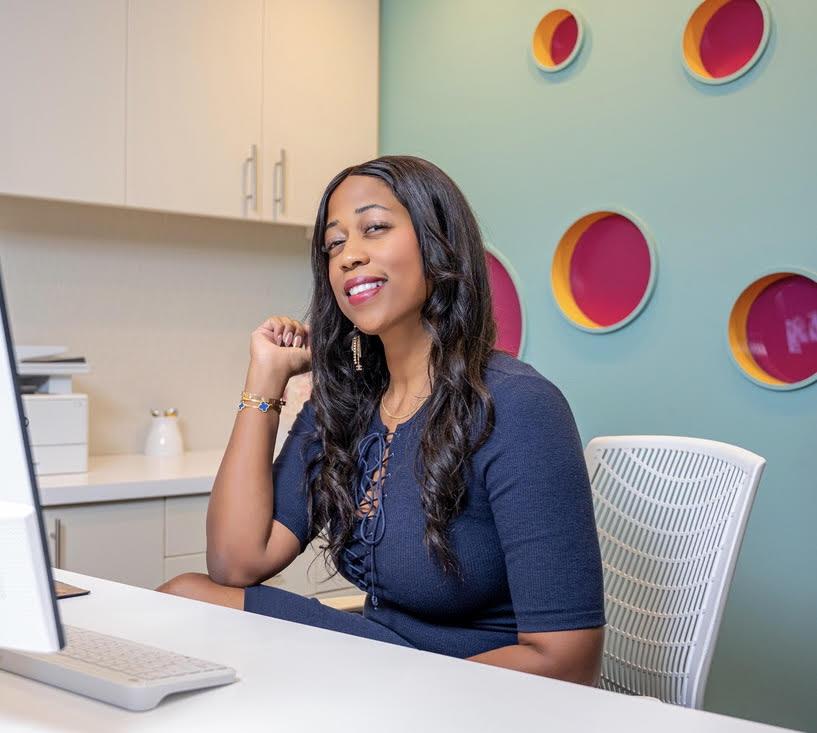 What is a pediatric dentist?
What is a pediatric dentist?
Simply put, Pediatric dentists are specialists who’ve dedicated our practices to caring for children’s total oral health care. It definitely gets deeper. I’m so happy that the field of pediatric dentistry has expanded to care beyond just teeth.
At our offices, we also look into our patient’s oral growth and development, airway, lip and tongue ties, and guide parents on oral habit cessation programs. After completing four years of dental school, pediatric dentists complete an additional two to three years of pediatric speciality training.
Some of us further our studies to become Board Certified, which requires that we undergo an intense, yet invaluable written and oral examination by the American Board of Pediatric Dentistry.
When should my child have his or her first dental visit?
If your baby has any oral or dental condition that you are concerned about, then they should be seen regardless of age.
There are times that we see babies very early on (as early as 2 weeks old) when there are issues with nursing and feeding. An evaluation of the frenulum may be necessary to eliminate any barriers to optimal feeding.
The standard of care, recommended by The American Academy of Pediatric Dentistry, is that we recommend that children establish a dental home by 12 months of age. Why so early? There are many reasons, but the main reason is prevention. We use anticipatory guidance to educate and guide our parents on how to care for their children’s teeth early on, before any issues arise. We also look into their growth and development, their airway, other oral structures, and also counsel parents on genetic factors that may play a role in their dental health. Nutritional counseling is also standard as well.
 What should I tell my child before the first visit?
What should I tell my child before the first visit?
When you talk with your child about their first dental visit we recommend you are honest and show a positive attitude. PLEASE don’t share any of your own dental anxieties! Try to answer all the questions that your child asks without making a big deal out of the experience.
Parents are usually very good at predicting their child’s behavior for their first dental visit. Some children will feel more at ease if they know every detail about the upcoming experience, while others do better if they are given less details. Every child is unique, and while you know how to best prepare your child, always describe it in a positive way so that he or she has a good experience.
I love child friendly dental books, as well as going on the pediatric dentist’s social media pages or websites to familiarize your child with the dental office experience prior to their visit. This is a wonderful introduction for children who are inquisitive!
My child (and I) are still nervous. Help please?!
As a practice owner for the last 12 years, I’ve been so fortunate to see so much growth when it comes to pediatric dentistry. Anxiety in the dental chair is a very real thing. I could write a book on reasons why, but as pediatric dentists we have the highest responsibility to make sure we do all we can to ensure a positive and comforting environment for our patients.
At Little Dental Studio, this is our top goal. I recently created and opened this smaller office for this reason. This office is much slower paced, and allows children to explore and go at their own speed. We take great care in the oral health education aspect. There are times we give our patient the lead and focus on brushing demonstrations, we talk about nutrition, daily oral care, and oral habits. We tailor the visits to what the parents would like.
Some parents just want their children’s teeth cleaned and examined–the traditional dental visit–and we honor that. But others, especially parents of anxious children, may opt for the more tailored approach.
We also have the traditional means to help with anxiety: nitrous oxide (laughing gas) and sedation, if needed.
Finally, our Solea CO2 laser is an amazing addition, as we’re able to fix cavities without the traditional drill and getting the patients numb. The laser is used instead of that. Painless, and no more drill…. we’ve found this to cure a large source of anxiety.
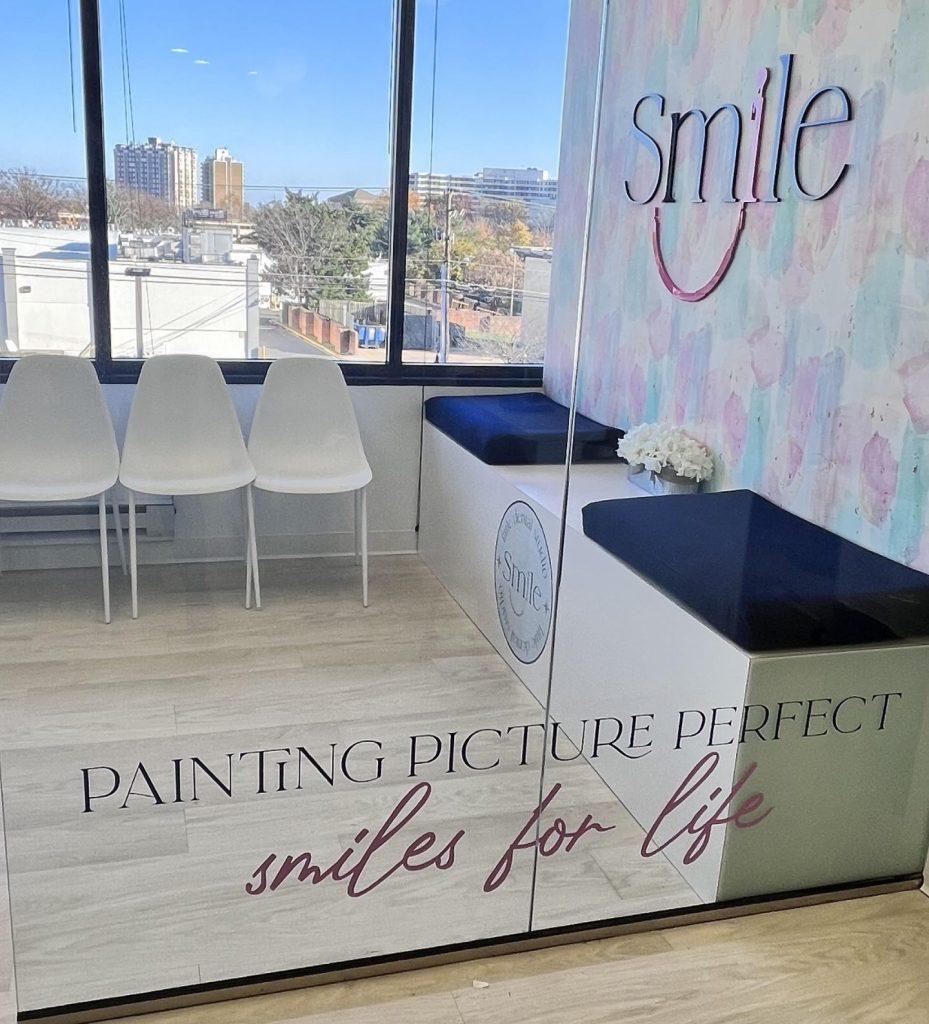 Why does my child get cavities? And what can I do to prevent dental decay?
Why does my child get cavities? And what can I do to prevent dental decay?
Dental cavities are a result of a disease process, not just isolated events. As dentists, we don’t talk enough about genetics and how they play a role in developing cavities. The type of bacteria that causes cavities; we found, runs in families. So there are times, it’s really not our patient’s fault. It’s important to interview our families to find the true root cause of the reason why their child is getting cavities. It’s not always so obvious.
Traditionally, some examples of cavity-causing factors include:
- genetics
- poor oral hygiene
- high frequency of eating fermentable carbohydrates
- enamel defects.
- mouth breathers
Some examples of cavity-preventing factors are:
- early preventive care
- fluoride and/or hydroxyapatite
- genetics
- parent education in cavity prevention
- good oral hygiene
- dental sealants
- Xylitol infused gum
Okay but are cavities in baby teeth actually a big deal?
I love to answer this question! It really comes from an inquisitive, honest place.
Yes, baby teeth are designed to fall out. But at the same time they are designed for a purpose.
Every inch of our children’s bodies is important. When a baby tooth gets a cavity, that pain and possible infection that may occur is no less painful or dangerous than when an adult tooth hurts or gets abscessed.
In fact, if a baby tooth gets a cavity, the progression of the cavity is actually way faster than when we get cavities. The surface area of the tooth is much smaller, so the cavity grows quicker and gets to the nerve (alas pain!) much quicker. So the question really becomes, do we want our kids in pain? Of course not.
Baby teeth are very important space holders for your child’s permanent teeth. If a baby tooth gets a cavity that is irreparable and possibly needs to be taken out, this is of detriment to the succeeding permanent tooth because there will be space loss if the proper treatment isn’t rendered. This will lead to orthodontic issues in the very near future.
Got it! I’m ready to up my cavity-prevention game. What do I need?
I love toothbrushes that are soft and that are biodegradable. At Little Dental Studio, we give out complimentary bamboo toothbrushes, which are a good eco-friendly alternative and help to reduce plastic waste in a big way. Bamboo toothbrushes are also antibacterial, as bamboo itself proves to be antibacterial. When choosing a bamboo toothbrush, I recommend any sustainable-based company.
If you prefer electric toothbrushes, Sonicare for Kids and Oral-B kids toothbrushes are wonderful.
When it comes to toothpaste, there are many sustainable options out there, but many don’t have fluoride in them. I always recommend toothpastes WITH fluoride or hydroxyapatite in them. So, in the office (and my home!) we use Quip toothpaste. Their tube and cap is recyclable with #2 plastics. Toms of Maine is also a gold standard, and can be recycled with #2 plastics as well. Risewell Toothpaste is also gaining popularity due to it’s addition of hydroxyapatite to remineralize teeth.
My favorite floss is from a company called Grin Natural. Their floss for both children and adults is phenomenal and totally biodegradable!
One more thing on sustainability: at our office, we participate in the Recycle on Us program. Bring your oral care waste to our office and we will collect and ship them to a company that repurposes the waste into useful items such as clothes, park benches, and more. We’ll also exchange your old brush for a new bamboo toothbrush!
Any final thoughts?
Yes! My motto is: A child’s smile can light up the room, let’s keep them smiling! Here are my final recommendations to keep those beautiful smiles:
- Bring your child as early as age one for their first dental visit. Or before if you notice a problem with feeding or their airway.
- Ensure great oral hygiene at home: brushing 2x/day at least, flossing daily, and fluoride rinses for children age 6 and up.
- Schedule your child’s examination visits every 6 months.
- Maintain a healthy diet, reducing or eliminating simple sugars.
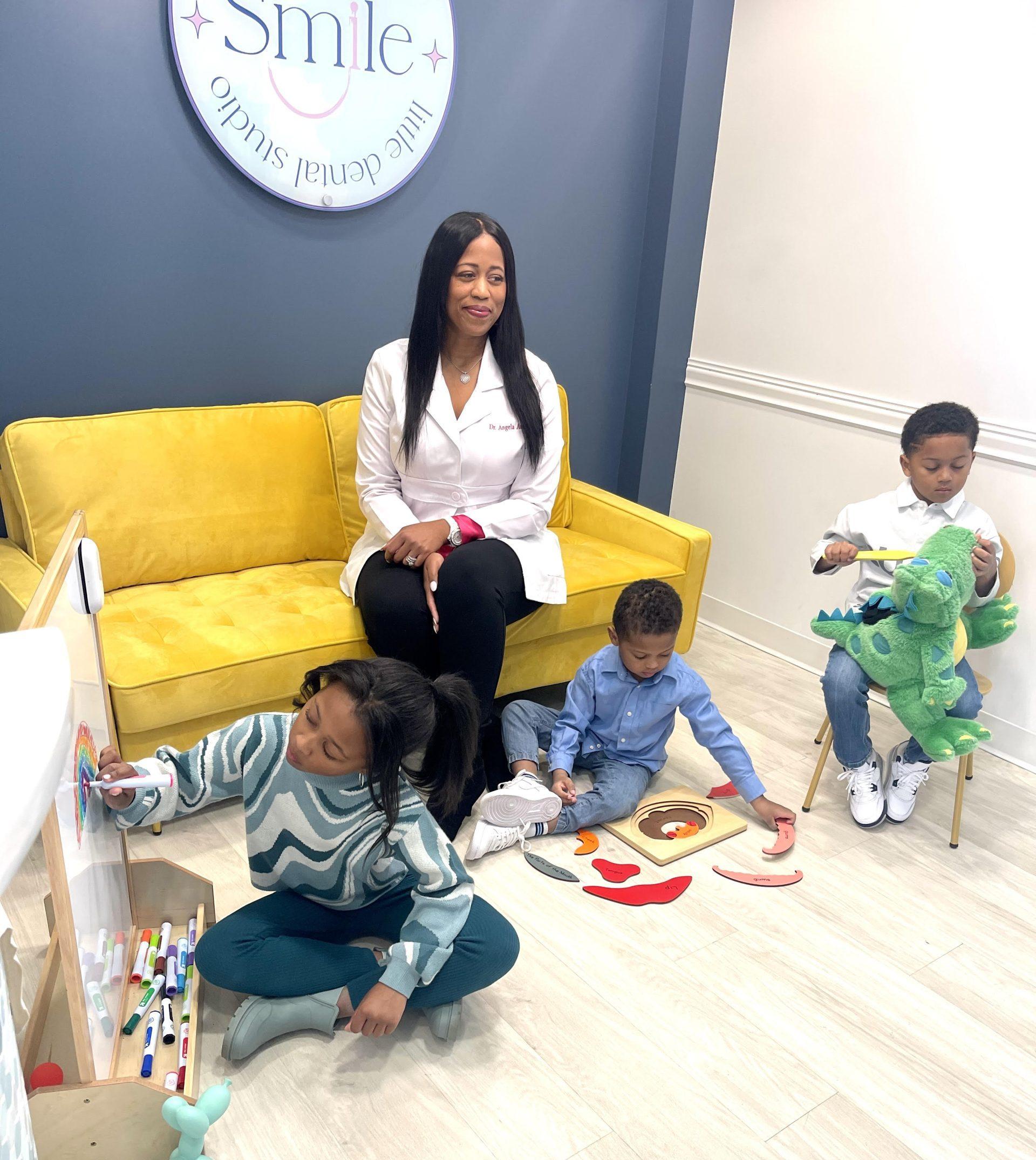 About Dr. Angela Austin
About Dr. Angela Austin
Dr. Angela Austin is a board-certified pediatric dentist and the founder of Little Dental Studio and Alexandria Children’s Dentistry. She earned her dental degree in 2004 from the University of Pennsylvania School of Dental Medicine and completed her pediatric specialty training at Children’s National Medical Center in Washington, DC where she served as chief resident.
Dr. Angela proudly practices as a Diplomate of the American Board of Pediatric Dentistry. As an Ivy League graduate and as a practicing board-certified pediatric dentist, Dr. Angela has made great strides to ensure competency in the area of pediatric dentistry.
Dr. Angela is proud to be one of the Top Dentists in both the prestigious Washingtonian Magazine and the Northern Virginia Magazine. She has won many awards and is a member of many dental organizations and is proficient in laser dentistry, orofacial myology, and functional pediatric dentistry-looking at oral structures and their impact on the entire body.
There’s something special about being a mother and practicing pediatric dentistry. Dr. Angela treats every single child who comes through her office as if each were her own. Dr. Angela is married and the mother of three beautiful children: Sage, AJ, and Jax! Family and her faith are extremely important to Dr. Angela.
During her spare time, she enjoys spending quality time with her family, attending church and church activities, working out, watching professional sports (Go Wizards!!), traveling, and her sorority, Alpha Kappa Alpha Sorority, Inc.
Learn More
Little Dental Studio
6303 Little River Turnpike
Suite 345
Alexandria, VA 22312
703.495.3565
littledentalstudio.com
@littledentalstudio on all socials








